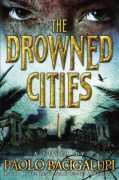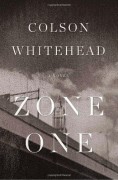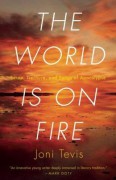Libraries at the End of the World: Books, Beer, and Banter
A cross-post with MSP Reading Time, the book segment of my local activities blog, Minneapolis-St. Paul Adventure time.
The other week, I attended Books and Bars, a Twin Cities book and social event that visits pubs and bars in Minneapolis and St. Paul, for the first time. The book on the docket for this session, held at Republic in Uptown, was Station Eleven by Emily St. John Mandel, the most riveting and affecting novels I have read this year. First, I must say, Station Eleven is the most fascinating, thought-provoking and touching post-apocalyptic novels I have read yet. In both its depictions of the “world before” and the new world in the aftermath of the “Georgian Flu,” an incredibly virulent virus that came out of nowhere to kill off an estimated 99% of the Earth’s population, the novel shows the resilience and power of the human spirit.
Mandel’s writing is incandescent, painting a vivid, realistic world of the future and what it lacks; “No more Internet. No more social media, no more scrolling through litanies of dreams and nervous hopes and photographs of lunches, cries for help and expressions of contentment and relationship-status updates with heart icons whole or broken, plans to meet up later, pleas, complaints, desires, pictures of babies dressed as bears or peppers for Halloween. No more reading and commenting on the lives of others, and in so doing, feeling slightly less alone in the room. No more avatars.” As she expressed, she wanted to write a love letter to the modern world by taking it all away.
These stories are about human resilience, and what can be done to preserve the culture of the past. As I mentioned in the discussion, I've been reading a lot of post-apocalyptic fiction lately (see my two prior BookLike entries), and it seems I'm not alone. In the last one, I discussed one of the overriding themes of the genre I had noticed; a preoccupation with the past, both the positive and the negative. This was reflected in Station Eleven as well, as the narrative spends nearly equal time in the world of today and twenty years in the future, when the survivors of the global epidemic begin to organize enough to try putting society back together, at least in a localized fashion.
Equally hopeful, brutal, and mundane, it follows a caravan of actors and musicians, the Traveling Symphony making their way along the banks of Lake Michigan, performing music and Shakespeare. The parallels between the plagues of Elizabethan England and that of the new world is an interesting thread, along with the question of what survives and what we lose, as before even the end a character muses “I've been thinking lately about immortality. What it means to be remembered, what I want to be remembered for, certain questions concerning memory and fame.” Arthur Leander, an actor who begins the novel by dying of a heart attack on stage on a snowy night in Toronto, coincidentally the night before the plague hits North America. Illustrating the lives of Leander and some of the people who knew and interacted with him creates a moving and effective bookend for the scenes of post-civilization. It shows what we had, good and bad, and what we lost, what we may or may not regain; and should we regain it all? A little piece of civilization, for instance, in the form of a small-press art comic book, had a wildly different effect on two survivors, which led to some of my favorite discussions in the book.
As expressed in one of the key quotes of the novel, the motto of the Traveling Symphony, “Survival is insufficient,” a maxim promoting the need for art and imagination in a world ravaged by pain and privation. A world not unlike our own, really. This quote, so integral to the life of people still trying to keep artistic and cultural expression alive in this world was itself a survivor from the old '90s TV-show, Star Trek: Voyager, a meaningful vestige of the previous world. Even an obscure, self-published graphic novel, the eponymous Station Eleven, survives the end of the world to have great, and completely different, impacts on the new world.
At Books and Bars, there was a lot of great discussion regarding the book among the participants as we enjoyed the craft brews and cheese plates offered, we talked about why, and how, the post-apocalyptic and dystopian genre has become so popular of late. One of the first things brought up (by myself, incidentally) was the parallels between Station Eleven and the play Mr. Burns: A Post-Electric play, which performed at the renowned Guthrie Theater this spring. Both were concerned with what would survive cultural collapse and how society might rebuild itself while recalling what came before. The setup of Mr. Burns is weirdly similar to Station Eleven; a group of survivors of a global plague begin talking about their favorite Simpsons episodes after the power grid and government fails- in a few years, they start a traveling troupe to perform recalled episodes in front of other settlements. A few decades later, the plays have transformed into an epic recounting of the sins and triumphs of the electric age, recalled by people who cannot actually remember it. What, of our current world, our comfortable lives today, will survive the ravages of time?
As I read this, and some of the other post-apocalyptic books I’ve recently, including the most recent entries, Paolo Bacigalupi’s The Drowned Cities and Colson Whitehead's Zone One, came to mind as well. Both of these works, too, are concerned with society picking up after disaster, and whether it is even possible, or desirable, that they do. Whether the brutal, war torn conditions of Washington, DC decades after global climate change and economic collapse, or the zombie plague, each are good pieces to compare and contrast with Station Eleven.
It got me thinking about my role as a librarian, a custodian and dissemination of information and knowledge. If some horrible catastrophe causes society to collapse and break down in the near future, would it be my, and my colleagues, mission to safeguard and preserve knowledge in order to return order and advancement to society? Even a large public library, so much technological, medical, historical, and cultural knowledge is kept, that with the right books (not effected by lack of electricity!), so much could be saved and carried into the future. But, as seen in Drowned Cities and Zone One, it is so easy to lose out.
This is why I found The World is on Fire: Scrap, Treasure, and Songs of the Apocalypse by Joni Tevis so fascinating as well, and a great companion piece to Station Eleven. Through a series of creative nonfiction essays, she explores various interesting topics through the lens of apocalypse and collapse, including popular culture and how your understanding of the past can transform your life in the future.
The Books and Bars discussion of Station Eleven will be broadcast on the StoryNorth podcast, available here. Next week, at Amsterdam Bar and Hall in St. Paul, where Julie Schumacher will be present to discuss her book, Dear Committee Members, which I talked about in my favorite books of 2014.
*Monthly theme music: "Here's Your Future," The Thermals, The Body The Blood The Machine, 2006


![By Colson Whitehead:Zone One: A Novel [Hardcover] - Colson Whitehead](http://booklikes.com/photo/max/100/150/upload/books/53/49/09f4600c330270bbf06f18492c19d57b.jpg)





 7
7
 2
2




